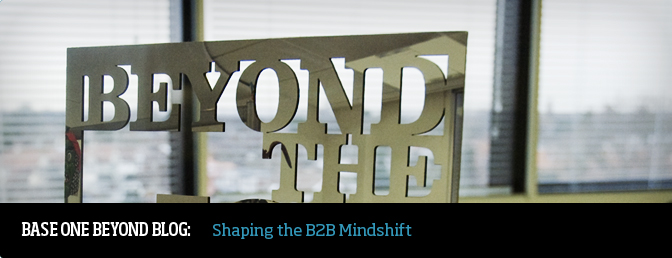B2B customer targeting: the only constant is change"
September 23, 2011 4:47 PM
Heraclitus, the Greek philosopher, believed that change, in all its forms, was pivotal to the cosmos. It's unlikely that he was thinking about B2B marketing at the time, but I can't help feeling that his doctrine could be easily applied to what B2B marketers are doing today - especially when thinking about how B2B buyers are changing.
Working on a recent campaign for a client (Epicor), I was reminded of this very point. Individual roles within organisations are radically changing and changing fast. Expertise in their chosen field, flexibility, commitment, all that is still required, but what is different, is the level of influence that each individual is now expected to exert on decisions relating to issues and topics which previously, they would not have even been consulted on, let alone asked to actively participate in with greater and greater insight.
One such role is that of the Finance Director or CFO...
The unflattering, stereotypical profile this individual has earned over the years, namely of being risk-averse, conservative and unadventurous, it's been influencing how we market to this audience, leading our creative thinking into making assumptions that this type of individual would not be receptive to a new style of marketing. This may have been the wider perception to date, but this belief must now take notice of the changes that have taken place and our marketing needs, in turn, to adapt accordingly.
It was fascinating to read many reports and studies describing how the financial role has taken on a whole new mantle and individuals in this function are now, by far, involved at the highest level of strategic decisions. In fact, it goes beyond this, they are expected to bring on change, seek it out, gather ever deeper insights and understanding of their business and market, in order to encourage a new vision for their organisation.
The expectation on the FD/CFO is now that of an individual who needs to be capable of shaping the future by understanding, through analytics, the past but more importantly what's coming up in the future. They are central to the success and survival of their organisation - they are critical in turning the business into an agile unit which is constantly adaptable, fast, efficient, able to cope with the endless market changes and customer demands.
This means, they themselves need to be more adaptable individuals, the old risk-averse is the new risk-taker, the old conservative is the new seeker of opportunities and patterns that could influence the overall direction of the organisation. The new FD needs to be well-informed of forthcoming trends and know how to capitalise on these.
How should marketers target the new FD?
In direct response to this change, our marketing needs to alter accordingly - molded around this new breed of B2B customer who has never been freer to choose for their organisation.
Our campaign was centred exactly on this idea, of FDs/CFOs being restricted by inflexible, unyielding ERP systems - which we visualised as big concrete boots - preventing our FD (who we named 'Ted') to gain deeper and faster insights into their business. The daily struggle of our Ted character represented that of all FDs out there, constantly trying to keep up with ever changing markets, rules and regulations and now daily under pressure to supply meaningful and insightful information upon which major strategic decisions are to be based.
The campaign was very successful because it resonated with FDs who have to work with inflexible systems all the time. The campaign was also aimed at the IT contacts who were identified as instrumental in helping FDs free themselves from their 'concrete boots'.
So take a look at our case study of the Epicor campaign for a more detailed summary of our "Concrete Boots" work and consider the teachings of our Greek philosopher that nothing stays the same. Except his theory, of course, which is as true today as it ever was...
Sites we love
- Casinos Not On Gamstop
- Non Gamstop Casinos
- Casinos Not On Gamstop
- UK Betting Sites
- Casino Sites Not On Gamstop
- Best Non Gamstop Casinos UK 2025
- Non Gamstop Casino UK
- Best Non Gamstop Casinos
- Non Gamstop Casinos UK
- Non Gamstop Casinos
- Casino Sites Not Blocked By Gamstop
- Non Gamstop Casinos UK
- Casino Not On Gamstop
- Non Gamstop Casinos
- Slot Sites UK
- Non Gamstop Casino Sites UK
- Casino Sites UK Not On Gamstop
- UK Casinos Not On Gamstop
- Non Gamstop Casino
- UK Online Casinos Not On Gamstop
- New Non Gamstop Casinos Uk
- UK Casino Not On Gamstop





Reply